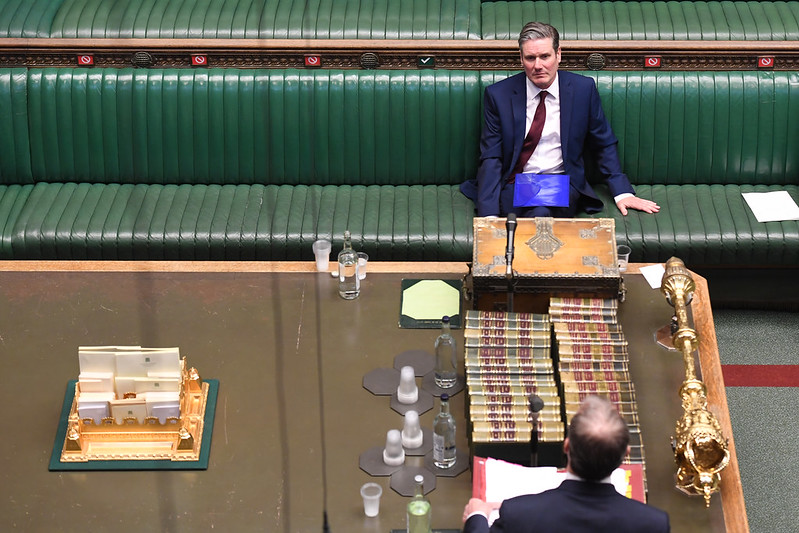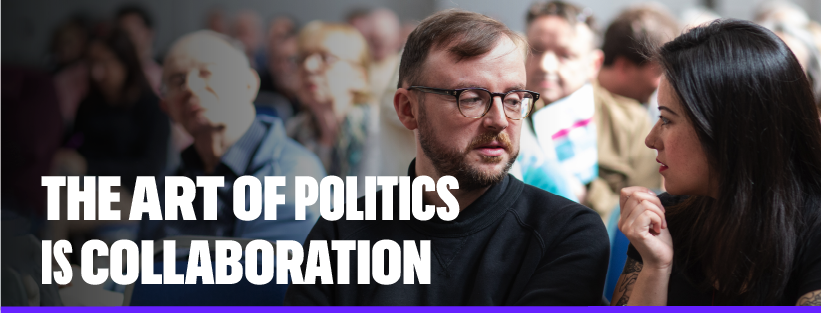On the anniversary of Keir Starmer’s election as Labour leader, Compass reflects on opportunities missed – and the radical, plural politics Labour needs to help deliver the Good Society.
If a week is a long time in politics, a year is an eternity. Especially a Covid year. Our political system demands the impossible of leaders and destroys them when they inevitably don’t deliver. Compass has always said we need new forms of leadership – open, empathetic, humble but bold, existing to serve so that the future is made by us, for us, not by them. But that is part of the long-term cultural shift we seek. For now, Keir Starmer, like all party leaders, will be judged by us and everyone on the old rules, but in extraordinary times.
As if Brexit wasn’t enough, Covid has been an unprecedented shock to politics as usual. Whether Labour should be doing better in the polls in this unchartered territory is anyone’s guess. What really matters is whether Labour has a developing vision, narrative, policy programme and an organising strategy that all start to cohere. So, as Keir looks back and to the future, this is where Compass orientates itself: what we would have done and will do next.

The first orientation point on our compass is electoral. The 124-seat mountain Labour has to climb for a majority of just one is still there. Next come boundary changes and voter ID suppression to make the incline steeper still. Labour simply cannot win alone.
The second orientation point is political. Social democracy becomes weaker everywhere the further it gets from the moment of its industrial creation. This means Labour and other social democratic parties lack strong roots into today’s networked culture. This structural decline is not Keir’s fault, but both New Labour and Corbynism, while sharing little, did buzz with at least some vitality as they tried but eventually failed to close the gap between the party’s past and its slowly declining present. Today there is little buzz around Labour. The easy task of not being Jeremy Corbyn was achieved but what now? Where are the ideas, alliances and forces not just to win office but to transform our society?
Meanwhile, the Tories are colonising much of the space ahead of Labour, such that the future of the country increasingly feels like a debate held within one party – its Onward, Danny Kruger, communitarian wing versus its Britannia Unchained, let’s-be-Singapore wing. When the Tories are borrowing and spending big – offering a furlough of over 18 months, reforming the NHS, ‘levelling up’ in ways that are politically targeted and offering big reforms for COP26 – Labour can only create room for itself by being radical. By 2022 the Tories will boast of having got Brexit and the vaccine done and delivering some kind of economic and social recovery. This doesn’t mean that the pandemic and Brexit won’t leave pain for those least equipped to bear it, or that the Tories won’t make mistakes, but we shouldn’t discount an election as early as autumn 2022 – or before Brexit cracks and spending cuts and/or tax rises appear. Meanwhile Labour continues to paint Boris Johnson as a clown, when he has constructed a big parliamentary majority, from the Blue Rinse to the Red Wall. Against this smart cultural politics, opposition by cross-examination at PMQs just doesn’t break through.
The third orientation point is structural. Any one of Covid, the climate emergency or the new tech revolution would have shaken us; together they are seismic. If now is not the time to be bold and radical, as we face an electoral mountain and the political dexterity of the Tories alongside this triple crisis, when is?
Opportunities have been missed, but they can still be grasped if Labour breaks free of an out-of-date mid-1990s playbook. The first lockdown was the moment for Labour to reach out and convene all the progressive parties, mayors, and corporate and civil society leaders to unite in the face of the pandemic. Compass helped construct the Build Back Better coalition of over 350 organisations, from the CBI to the TUC. Sadly, Labour refused to join in, and Johnson nabbed the slogan. OK, so do it now: do something big for a post-Covid recovery. Start a big public conversation on a new economic, social and environmental settlement match fit for the 21st century, of a scale and ambition resonant of the great Liberals Keynes and Beveridge. This is where basic income, universal basic services, a shorter working week, a care economy and a Green New Deal can all fit together, underpinned by a more progressive tax system. None of these are ‘Labour ideas’ – but the party can lead an alliance to make them happen.
Labour should do the same for our democracy: not through a commission that sits in private, but through a convention that opens its doors for citizens to decide for themselves how they should be governed – from the local to the global, including proportional representation. An open road with a clear sense of direction on democracy, equality, social security and the environment is what we seek and what society needs.

In all this it’s critical Labour does three things. First, while the so-called ‘Red Wall’ seats matter, the idea that voters in those or any seats fit a simple stereotype that must be pandered to with, say, a flag unbalances the Labour offer and starts to lose social liberals in those seats and the big cities. Look at how the Greens and the Northern Independence Party will take potentially vital votes from Labour in the Hartlepool by-election. Instead, Labour should transcend this zero-sum game with a society-wide narrative of renewal.
Second, make the offer on the basis of principle, because you believe in it, not just on the basis of competence or to court votes.
Third, Labour has to reach out to the other progressive parties to form an alliance for transformative change. A record fifth straight election loss would be terrible for our country. If Labour cannot win alone, then as the biggest tent in the progressive campsite it must share some power with others. And it must do so because pluralism makes us intellectually, not just electorally, stronger. Labour, Greens and Liberals need each other. Leave it too late and this becomes a defensive coalition of chaos.
Like all the progressive parties, there are so many amazing people in Labour. The role of some of the mayors and council leaders during the pandemic has been so refreshing, even while their powers remain so weak. The campaign to get the party to back PR is really gathering pace. 211 CLPs back the shift and Compass is delighted to be part of Labour for a New Democracy. We are also delighted to be working with Labour Together and communities spokesperson Steve Reed MP on the New Power Project. The party can build on all this and the energy of members who worked in their communities over Covid, as well as the idealism of those who backed Jeremy Corbyn. But Keir has to reach out and build bridges inside Labour, not destroy them.
It is not easy being the leader of the Labour Party, especially in a pandemic. But it’s easier in a moment of such huge flux if you go with the flow of energy for change, working with all the people and progressive parties who broadly want the same as you.
Win together or lose alone? Share some power or have none? Open up or stay closed? Small reforms or big change? These are the stark choices facing Labour and Keir in his second year. And like all political leaders, he will respond to pressure. Compass will build the pressure for feasible but desirable change through the politics of alliance building. Better still, we will demonstrate the transformative change already happening in our political system and communities. Labour can learn and change if it wants to. But we will build a new politics, for a new and good society. Nothing less will do.
No one person, party or organisation can deliver the change we need. Join Compass in building an alliance of of ideas, parties, organisations and people to transform our society.
